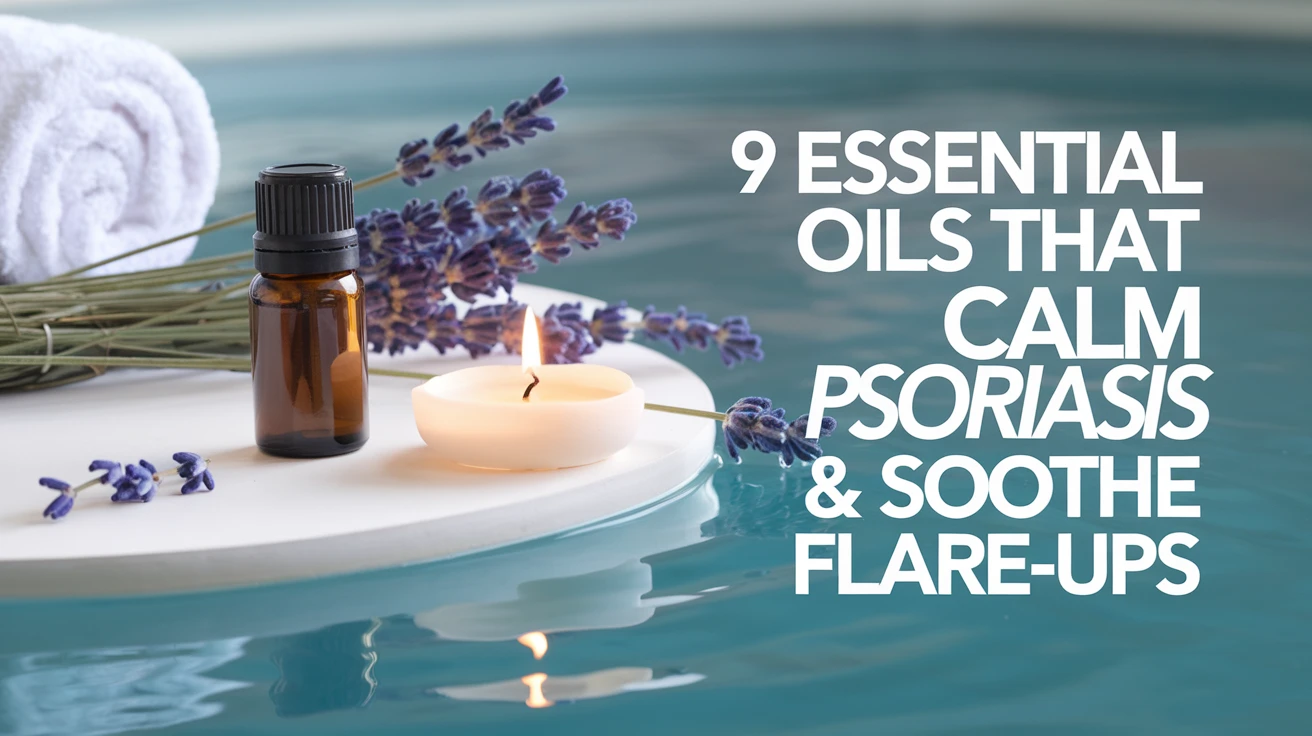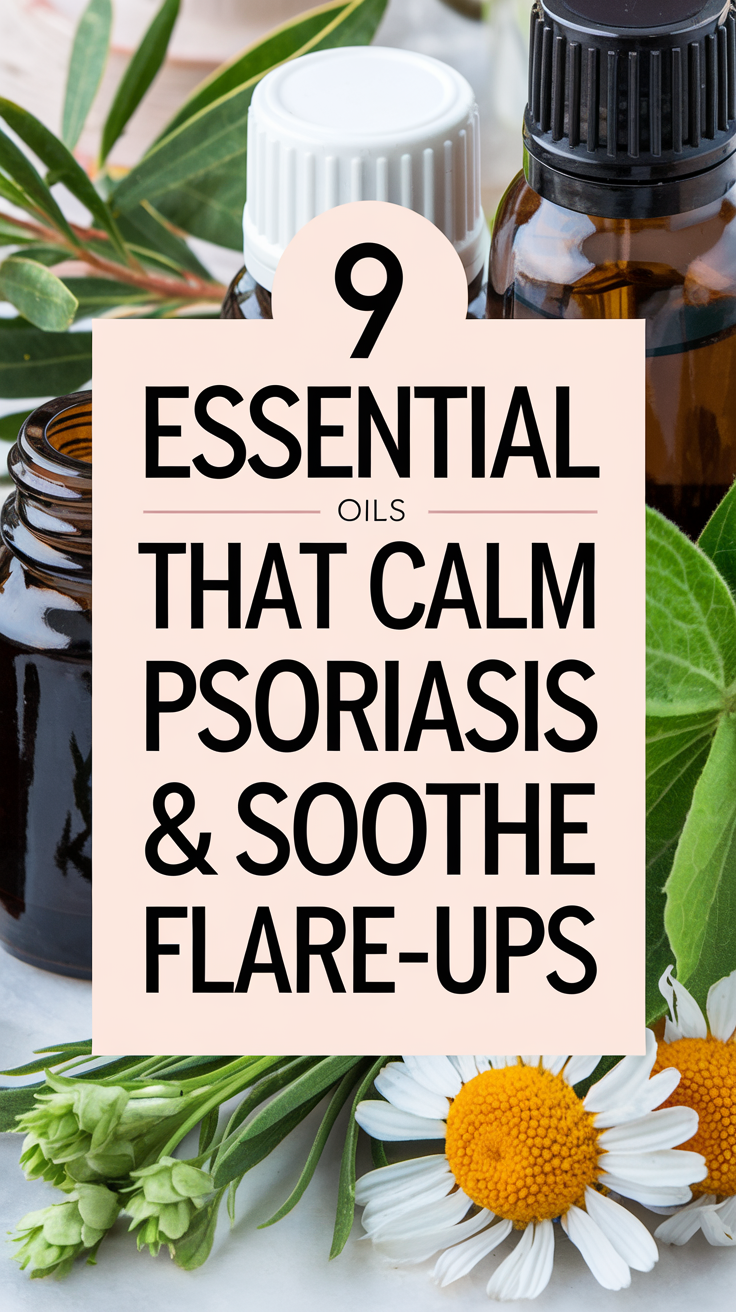
Introduction
Living with psoriasis isn’t just about managing the physical symptoms – it’s an emotional journey too. The itching, flaking, and discomfort of psoriasis flare-ups can affect everything from your clothing choices to your social confidence. While conventional treatments have their place, many people are turning to essential oils for psoriasis relief as a complementary approach. These natural plant extracts offer anti-inflammatory, antimicrobial, and skin-soothing properties that may help calm irritated skin and reduce the frequency of flare-ups.
I’ve spent years researching natural remedies for inflammatory skin conditions, and I’ve seen firsthand how the right essential oils can make a difference in managing psoriasis symptoms. But let’s be clear – these aren’t miracle cures. They’re tools in your wellness arsenal that, when used correctly, might just give you the relief you’ve been searching for. Ready to discover which oils could help soothe your skin? Let’s dive into the 9 essential oils that show the most promise for psoriasis management.
Why Consider Essential Oils for Psoriasis Relief?
Before we explore specific oils, it’s worth understanding why essential oils might benefit psoriasis sufferers. Psoriasis is characterized by inflammation and accelerated skin cell growth. The best essential oils for this condition typically offer:
- Anti-inflammatory properties that may reduce redness and swelling
- Antimicrobial effects that help prevent secondary infections
- Skin cell regulation that might slow excessive cell turnover
- Stress-reducing aromatherapy benefits (as stress is a common trigger)
- Moisturizing effects when combined with carrier oils
Now, let’s explore the oils that could become your skin’s new best friends.
1. Tea Tree Oil: Nature’s Antiseptic for Psoriasis
Tea tree oil stands out as one of the most researched essential oils for skin conditions. Its powerful antimicrobial properties make it particularly valuable for psoriasis, where skin barrier disruption can lead to secondary infections.
- Contains terpinen-4-ol, a compound with proven anti-inflammatory effects
- Helps reduce the bacteria that can worsen psoriasis plaques
- May help remove scales and reduce itching
To use tea tree oil safely, always dilute it in a carrier oil like coconut or jojoba oil (aim for a 2-5% dilution – about 12-30 drops per ounce of carrier oil). Apply to affected areas once or twice daily, but stop immediately if irritation occurs.
Pro Tip: Tea tree oil works particularly well for scalp psoriasis when added to your regular shampoo (5-10 drops per ounce). Just make sure to do a patch test first, as some people find it too drying.
2. Lavender Oil: The Calming Multi-Tasker
Lavender isn’t just for relaxation – it’s a powerhouse for skin health too. For psoriasis sufferers, lavender oil offers a trifecta of benefits: stress reduction, anti-inflammatory properties, and skin cell regulation.
- Contains linalool and linalyl acetate, compounds with proven anti-inflammatory effects
- Helps reduce anxiety and stress, which are common psoriasis triggers
- Promotes wound healing and skin regeneration
- Generally gentle enough for sensitive skin (though always patch test)
I’ve found lavender particularly helpful during nighttime flare-ups. Try adding 3-4 drops to a tablespoon of cold-pressed olive oil and gently massage into affected areas before bed. The aromatherapeutic benefits may help you sleep better too – and better sleep often means less severe psoriasis symptoms.
Pro Tip: For a double-duty treatment, add 10 drops of lavender oil to a warm (not hot) bath along with a cup of colloidal oatmeal for whole-body relief.
3. Frankincense Oil: Ancient Wisdom for Modern Skin Problems
Frankincense has been valued for thousands of years for its medicinal properties, and modern research is beginning to validate its benefits for inflammatory skin conditions like psoriasis.
- Contains boswellic acids that specifically target inflammation pathways
- May help regulate the immune response in the skin
- Promotes cellular regeneration and healthy skin turnover
- Has a grounding scent that can reduce stress-related flare-ups
Frankincense blends beautifully with other oils, making it an excellent base for a psoriasis-fighting blend. Mix 5 drops frankincense, 3 drops lavender, and 2 drops tea tree with 2 tablespoons of argan oil for a deeply penetrating treatment.
Pro Tip: Look specifically for Boswellia carterii or Boswellia serrata varieties of frankincense, as these contain higher levels of the beneficial compounds for skin health.
4. Peppermint Oil: Cooling Relief for Burning Psoriasis
When psoriasis patches are hot, itchy, and driving you crazy, peppermint oil can provide that “ahhh” moment of relief. Its cooling menthol content creates an immediate sensation of comfort while potentially addressing underlying inflammation.
- Creates an immediate cooling sensation that interrupts the itch-scratch cycle
- Contains menthol that has analgesic (pain-relieving) properties
- Offers antimicrobial benefits that help protect compromised skin
- May improve blood flow to affected areas, potentially speeding healing
Peppermint is potent, so use it sparingly. A 1-2% dilution (6-12 drops per ounce of carrier oil) is sufficient for most people. I recommend mixing it with coconut oil, which adds additional moisturizing benefits.
Pro Tip: For quick relief on the go, prepare a small roller bottle with your peppermint dilution. Keep it in your bag or desk drawer for immediate itch relief without messing up your clothes.
5. Geranium Oil: Balancing Oil Production and Inflammation
Geranium oil is particularly valuable for psoriasis because it helps regulate oil production while reducing inflammation – a perfect combination for troubled skin.
- Contains geraniol and citronellol, compounds with documented anti-inflammatory effects
- Helps balance sebum production, beneficial for both dry and oily psoriasis patches
- Improves circulation to the skin, potentially accelerating healing
- Has a pleasant, uplifting scent that can improve mood
Geranium oil blends well with most carrier oils, but I’ve found jojoba oil to be an ideal partner since it mimics the skin’s natural sebum. Use a 3% dilution (about 18 drops per ounce) and apply to affected areas twice daily.
Pro Tip: For psoriasis that alternates between dry, flaky patches and oilier areas (common in scalp psoriasis), geranium oil can help normalize both extremes when used consistently.
6. Oregano Oil: The Powerful (But Potent) Option
Let me be upfront – oregano oil is not for the faint of heart or the sensitive-skinned. However, for stubborn, thick psoriasis plaques that aren’t responding to gentler treatments, oregano oil’s potent properties might be worth considering.
- Contains carvacrol and thymol, compounds with exceptional antimicrobial and anti-inflammatory effects
- May help address fungal components that can complicate psoriasis
- Has been shown to reduce certain inflammatory markers in research studies
Due to its strength, oregano oil should be heavily diluted – no more than a 0.5-1% dilution (3-6 drops per ounce of carrier oil). Always do a patch test, and never use it on broken or severely irritated skin.
Pro Tip: Consider using oregano oil as a spot treatment for particularly stubborn plaques rather than over large areas. Alternate days of application with rest days to prevent irritation.
7. Chamomile Oil: Gentle Enough for the Most Sensitive Skin
When your psoriasis is in an actively inflamed state, or if you have naturally sensitive skin, chamomile oil offers relief without aggravation. Both German chamomile (Matricaria recutita) and Roman chamomile (Anthemis nobilis) have benefits, though German chamomile is particularly noted for its anti-inflammatory properties.
- Contains chamazulene and bisabolol, blue-colored compounds with remarkable anti-inflammatory effects
- Helps soothe irritation and reduce redness almost immediately
- Promotes healing of damaged skin barriers
- Safe enough for use even during active flares
Chamomile oil can be used at slightly higher dilutions than other essential oils – up to 5% (30 drops per ounce of carrier oil) is generally well-tolerated. Sweet almond oil makes an excellent carrier for chamomile, adding its own skin-soothing benefits.
Pro Tip: For a particularly soothing treatment, refrigerate your chamomile oil mixture for an hour before application. The cooling effect combined with chamomile’s anti-inflammatory properties provides double relief.
8. Rosemary Oil: Circulation-Boosting Scalp Savior
For those battling scalp psoriasis – one of the most frustrating and visible forms of the condition – rosemary oil offers specific benefits that target both symptoms and underlying causes.
- Improves circulation to the scalp, potentially increasing nutrient delivery to affected areas
- Contains rosmarinic acid, a potent anti-inflammatory compound
- Has analgesic properties that can reduce scalp discomfort
- May help regulate excessive skin cell production
To use rosemary oil for scalp psoriasis, add 10-15 drops to a tablespoon of carrier oil (jojoba works well for scalp applications). Massage into the scalp, focusing on psoriasis patches, and leave on for at least 30 minutes before shampooing. For an intensive treatment, wrap your hair in a warm towel and leave overnight.
Pro Tip: Combine rosemary oil with apple cider vinegar (1 teaspoon of diluted rosemary oil to 1 cup of ACV diluted with 1 cup water) for a post-shampoo rinse that helps remove scale buildup while soothing inflammation.
9. Helichrysum Oil: The Premium Skin Regenerator
I’ve saved what might be the most impressive (albeit expensive) essential oil for last. Helichrysum, sometimes called immortelle or everlasting, has earned a reputation as a skin healing superstar – and for good reason.
- Contains unique compounds like italidiones that reduce inflammation and promote cell regeneration
- Helps fade the discoloration that often remains after psoriasis plaques heal
- May help reduce scarring from long-term psoriasis patches
- Has gentle astringent properties that help with scaling without overdrying
Due to its cost, helichrysum is best used strategically. A 2% dilution (12 drops per ounce of carrier oil) applied to persistent or severe patches can make a noticeable difference over time. Rosehip seed oil makes an excellent carrier, adding its own skin-regenerating properties.
Pro Tip: If pure helichrysum oil is beyond your budget, look for quality skincare products that list it among the first several ingredients – you’ll still get benefits without the premium price of the pure oil.
How to Use Essential Oils Safely for Psoriasis
Before you start applying these powerful plant extracts to your skin, let’s cover some important safety guidelines:
- Always dilute: Never apply essential oils directly to the skin, especially on psoriasis patches where the skin barrier is already compromised.
- Patch test first: Apply a small amount of your diluted oil to an unaffected area and wait 24 hours to check for reactions.
- Be consistent but patient: Essential oils aren’t overnight miracle workers – give them at least 2-3 weeks of regular use before evaluating effectiveness.
- Inform your dermatologist: Always let your healthcare provider know about the complementary treatments you’re using.
- Quality matters: Choose pure, therapeutic-grade oils from reputable companies. Cheap, adulterated oils may contain irritants.
Remember that what works for one person’s psoriasis may not work for another’s. You might need to experiment with different oils and combinations to find your perfect match.
Creating Your Own Psoriasis-Soothing Essential Oil Blend
While individual oils have their benefits, I’ve found that thoughtfully combined blends often deliver the best results. Here’s a starter formula that combines several of the oils we’ve discussed:
Calming Psoriasis Blend
- 10 drops lavender essential oil
- 8 drops frankincense essential oil
- 5 drops chamomile essential oil
- 3 drops geranium essential oil
- 2 drops tea tree essential oil
- 2 ounces (60ml) of carrier oil (equal parts jojoba and evening primrose oil work well)
Mix all ingredients in a dark glass bottle and apply to affected areas twice daily. Store away from direct sunlight and use within 3 months for maximum effectiveness.
Key Takeaways
- Essential oils can complement conventional psoriasis treatments but aren’t replacements for medical care.
- Anti-inflammatory oils like lavender, chamomile, and frankincense are generally good starting points for most people.
- Always dilute essential oils properly and perform patch tests before widespread application.
- Consistency is key – use your chosen oils regularly for at least several weeks to evaluate effectiveness.
- Different body areas may respond better to different oils, so personalization is important.
Conclusion
Living with psoriasis means navigating a complex relationship with your skin, often involving trial and error to find what brings relief. Essential oils for psoriasis represent just one avenue of the holistic approach many find helpful in managing this chronic condition. While these natural extracts won’t cure psoriasis, they may offer meaningful symptom relief and improved quality of life when used as part of a comprehensive management plan.
Remember that your psoriasis journey is unique to you. What works wonders for someone else might not be your solution – and that’s perfectly normal. Be patient with yourself as you explore these natural options, and don’t hesitate to adjust your approach based on how your skin responds. With the right combination of conventional treatment, essential oils, stress management, and other lifestyle factors, many people find a comfortable balance in managing their psoriasis symptoms.
Frequently Asked Questions
Can essential oils cure psoriasis?
No, essential oils cannot cure psoriasis, which is a chronic autoimmune condition. However, they may help manage symptoms, reduce inflammation, soothe irritation, and potentially extend periods between flare-ups when used as part of a comprehensive treatment approach.
How do I dilute essential oils for psoriasis treatment?
For most essential oils, a safe dilution range is 2-3% for localized application (12-18 drops per ounce of carrier oil). For sensitive skin or during active flares, reduce to 1% (6 drops per ounce). Stronger oils like oregano should be diluted even further to 0.5-1% maximum. Always use a quality carrier oil like jojoba, coconut, olive, or sweet almond oil.
Are there any essential oils I should avoid with psoriasis?
People with psoriasis should generally avoid highly sensitizing essential oils, including cinnamon, clove, lemongrass, and citrus oils (especially if applying to areas exposed to sunlight). These can trigger irritation or photosensitivity reactions. Also, avoid oils



